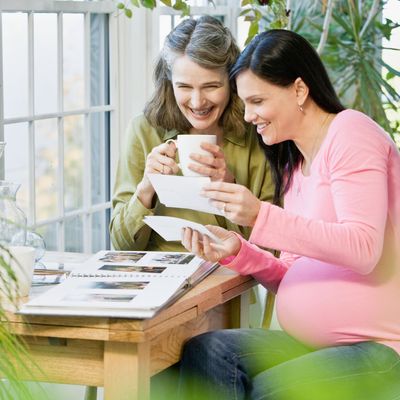
Yesterday morning, People confirmed that Janet Jackson, who is 50 years old, is pregnant with her first child. Once extremely rare, pregnancy over 40, and even into the early 50s, is an increasingly common phenomenon because of recent advances in fertility and prenatal health care. In fact, from 2000 to 2013, the number of babies born to women 50 or older increased by nearly 200 percent. The answer to “How old is too old?” is now a moving target, and the hurdles to having kids at what used to be called an “advanced maternal age” are less significant than one might suspect.
When I got pregnant, I thought that I was pretty old to be a first-time mother. I confess I knew nothing about babies, and I didn’t have an arsenal of knowledge about motherhood or fertility. Almost none of my friends had kids, and I’d spent much of my adulthood avoiding all children-centric conversations. This led me to the false assumption that I, at 35, was old.
But my first time in my obstetrician’s office, everyone looked to be my age, if not a little older. When I met my doctor, I almost immediately informed him that I was old. “You’re not,” he assured, laughing at me for the first of what would be many times. He was right. Sort of.
The average age of first-time mothers has gone up considerably in the past 40 years. In the early 1970s, it was 21 years old. By 2000, it was 24.9, and by 2014, it was 26.3. Some of this is due to the rapid decrease in teen pregnancies. But the middle is rapidly rising too, because of improved access to sex education, birth control, and that most women now have careers — all of which lead to women waiting longer to have children.
“Biology is what it is, and that hasn’t changed significantly in the last thousand years” says Dr. Jacques Moritz, an affiliate associate professor OB-GYN at Weill Cornell. “But we’ve found some pretty effective ways to get around biology.”
While most insurance companies consider anyone over the age of 35 to be of an “advanced maternal age” (sometimes referred to as “geriatric” in England), this, he says, is largely arbitrary and was set long ago. It’s for billing, and it’s how companies decide what types of testing they will cover for women during their pregnancies.
“Physically, nothing changes at 30 or 35 or 40 or 45,” Dr. Moritz says — aside from fertility. “The human body is capable of carrying the baby — physically, there is nothing wrong, and women even into their 50s and 60s can do it, as long as they are healthy,” Moritz says. It’s simply that we become, over time, less fertile — we run out of eggs, and their quality decreases. In fact, he says, for many women, sometime after 40 is where the “cliff” is, and many women are unaware of how quickly and steeply it can decline.
This is, of course, where egg freezing comes in handy, and in the past ten years technology has changed a lot. While the success rates vary steeply and methods are improving all the time, non-fertilized eggs (i.e., just eggs) have about a 25 to 35 percent success rate, according to one recent estimate. This means they survive being thawed and then go on to be successfully fertilized. Fertilized eggs that are frozen fare much better.
This all sounds like a fairly low success rate, but it’s increasing every year, says Dr. Moritz, and it may be the best option, considering that at 45, experts say it is “nearly impossible” to conceive using your own, current-day eggs. Anecdotally, it happens all the time, but the odds are against it.
Also, “after 40, unfortunately many of a woman’s eggs are chromosomally abnormal,” Dr. Moritz says, which means a very high potential for birth defects. One estimate puts it at 90 percent, which means freezing your eggs also sidesteps that issue, since your eggs will be frozen in time at whatever age you freeze them. Most doctors who deal with egg freezing suggest that the best time to do it is between the ages of 30 to 35.
Egg freezing allows us to defer pregnancy or to simply not feel so rushed into making a life-changing decision while we pursue other things. But, it is at least for now, prohibitively expensive, running from $10,000 to $15,000 for one cycle of egg removal, plus an additional fee for each year of storage.
And for now, many insurance companies view 35 as a magical line one crosses, never to return. The upside is that it usually means older moms get advanced genetic testing for free — testing that Dr. Moritz says he recommends for all of his patients, regardless of age, if they can afford to pay for it, because it is so valuable.
Advanced maternal age: As Janet Jackson proves, it’s a thing that does and doesn’t exist. Our bodies are still in great shape and perfectly capable of carrying a pregnancy to term at 40 or 45 or 50, but it’s also an inescapable fact that we have fewer eggs left, and they deteriorate in quality the longer we wait. “Egg freezing is going to improve so much so fast and come down in cost very quickly,” Dr. Moritz says, and this should be reassuring to every woman.




